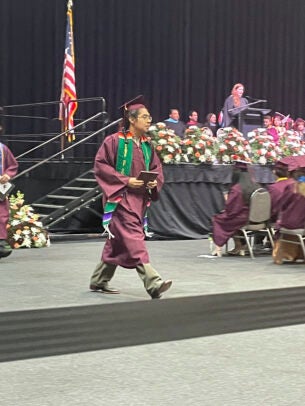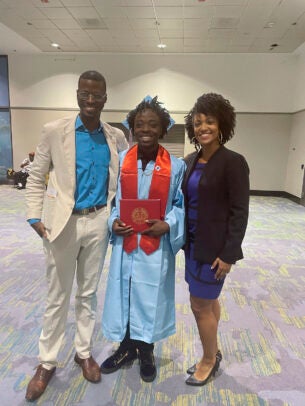UIC’s Brothers Teaching program prepares men of color to be impactful teachers
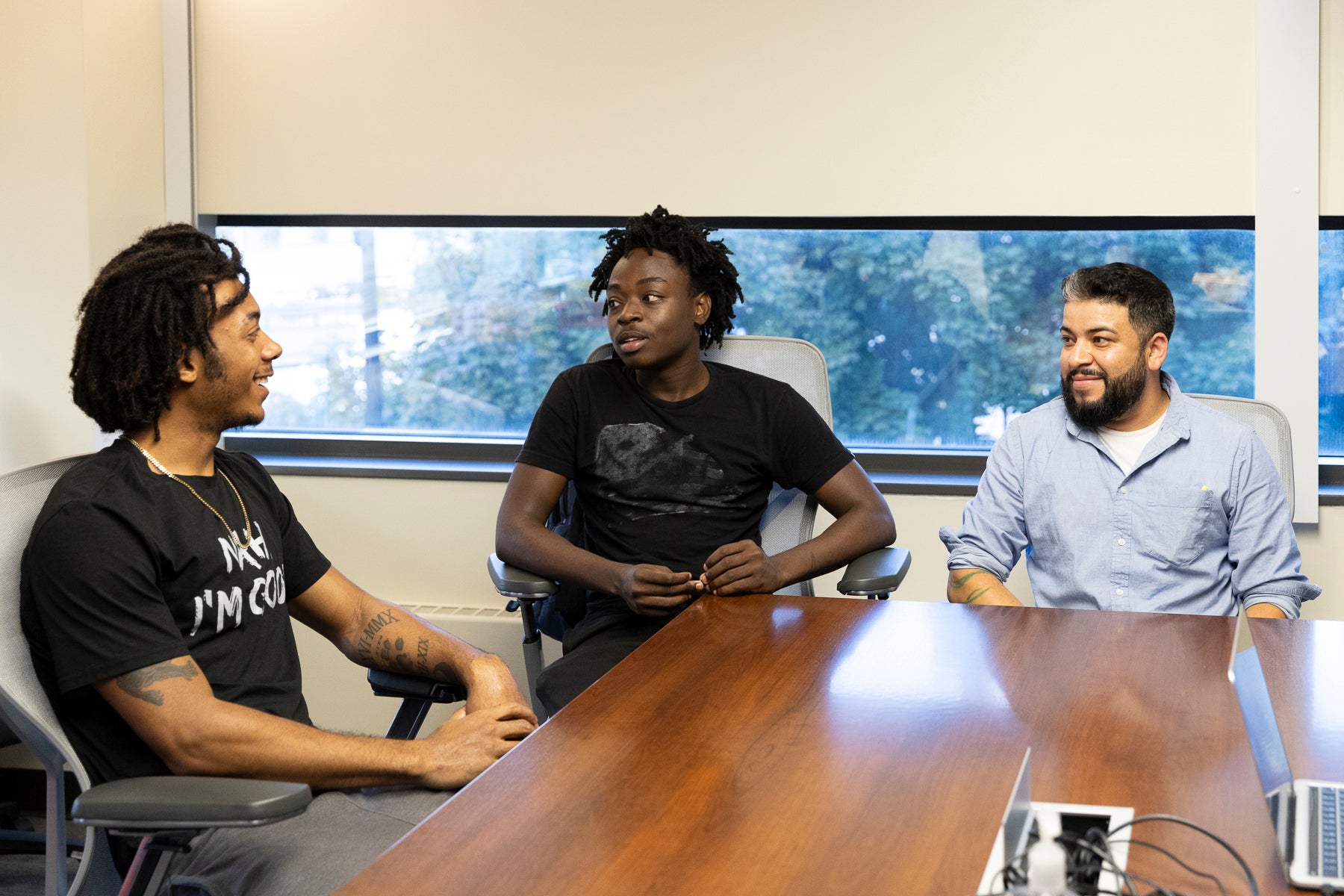
As the young men walked into a conference room at the UIC College of Education, they were met with the words “Welcome! Brothers Teaching” projected on a screen.
The men are students in the college’s new Brothers Teaching initiative, which aims to boost the number of certified male teachers of color working in Illinois schools.
According to the Illinois State Board of Education, the need to develop more male teachers of color is great. Only 4% of the approximately 135,000 teachers in Illinois are men of color. What’s more, research shows that when students have Black or brown men as their teachers or in their schools, there are tremendous academic outcomes for them.
Brothers Teaching at UIC builds on the success of an earlier program, the multi-institution Call Me MiSTER program, which has a similar mission. Currently, 12 students are involved in the UIC program, which offers full four-year scholarships, professional development, mentoring and networking to students who want to pursue teaching professions. Students major in a program that will earn them a license to teach, such as urban education in the College of Education or teaching of mathematics or teaching of history in the College of Liberal Arts and Sciences. Many of the students had their scholarships announced at their high school graduations in front of their graduating class.
Decoteau Irby, associate professor in the department of educational policy studies, directs the initiative to increase the number of Black and brown male teachers and provide professional development and technical assistance to other institutions.
Weekly ‘air hugs’
While their coursework may vary, what binds these young men together is a weekly class led by Jeniece Fleming Morrison, the Brothers Teaching coordinator, where they discuss educational topics and get advice and mentoring from students from earlier cohorts. This can include time-management tips, help with homework and guidance on navigating campus life.
“It’s a really big air hug that you don’t get anywhere else,” said Jaylen Hall, a first-year student. “I really enjoy the time that we have together. Even though it’s one hour a week, it’s a really good talk.”
As the students walked into their class, Morrison welcomed them and asked the young men how their weeks had progressed. After several students replied that they were tired, Morrison responded with advice often unheeded by college students.
“Everybody’s tired; go to bed,” Morrison said, laughing.
She became more serious and referred the students to the previous week’s class discussion, where they focused on emotional intelligence. She asked them to recall what that meant.
“We were talking about how each young student in school is getting impacted and how they sometimes had emotional trauma in them and needed new strategies to succeed,” said Nicolaus Wilburn, a first-year student studying urban education.
Morrison reminded them of their previous discussions, how they had tied the topic to recent school shootings across the country, and the importance of future teachers recognizing how they deal with their stress.
“Sometimes we’re taught to not have emotions at all, and sometimes people show what I would argue is too much emotion,” Morrison said. “We talked about balance.”
She led the students in an online test designed to gauge how they recognize moments of stress and how they can deal with them and with their emotions.
After taking the test in silence, students talked about how they deal with stress. Some admitted to lashing out, and some said they are hard on themselves. When they become teachers, Morrison told them, it will be important to know how to tap into their feelings. By knowing how they deal with stress themselves, they’ll be able to notice when their students go through stressful life situations and need help.
“When you see a change in behavior, this is for you to know,” Morrison said. “You may have a student who is always on time, always attentive, raising their hand and paying attention, and you notice one week they switch gears. That should signal to you that something’s wrong.”
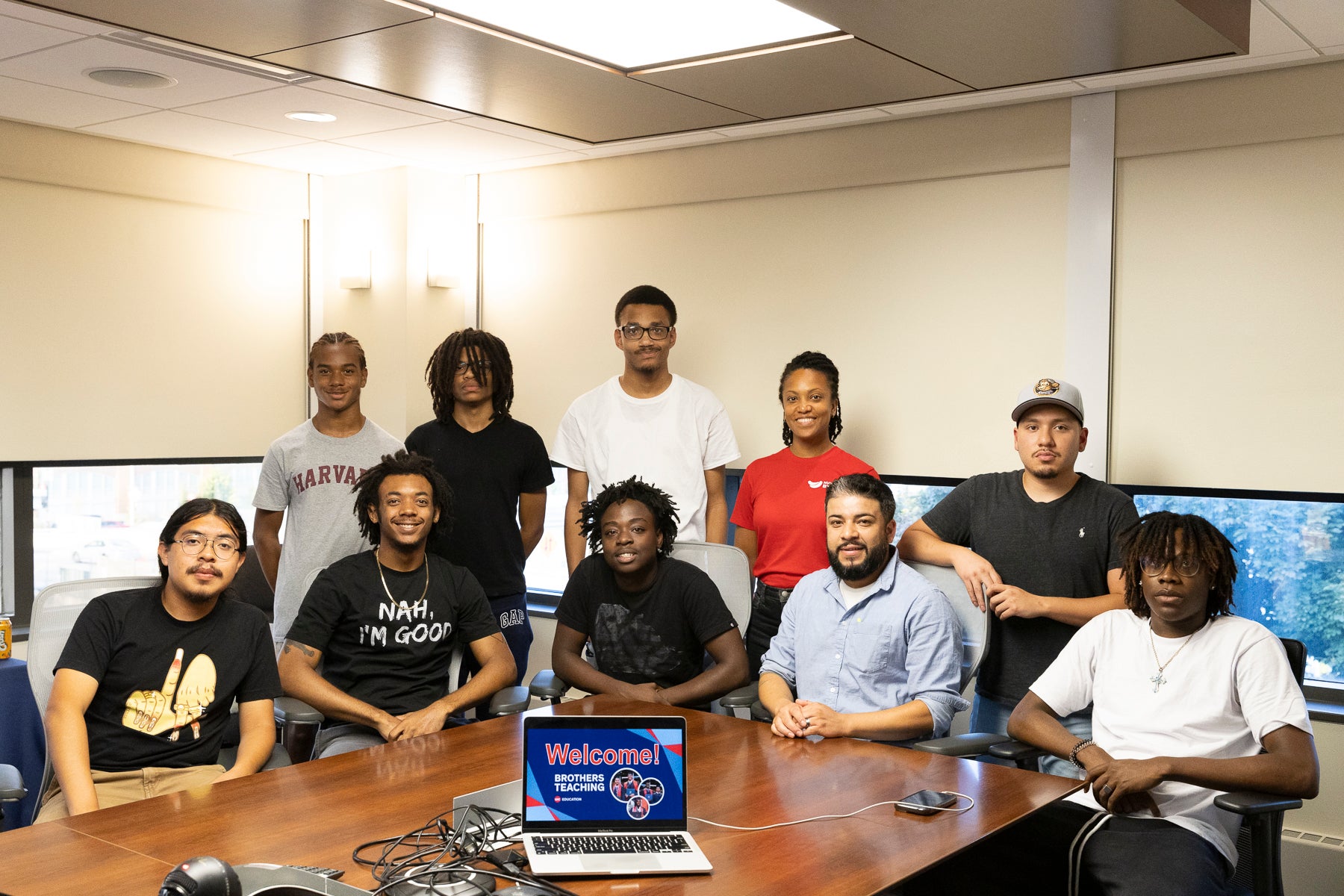
Paying it forward
Torrin Snow, a first-year student, said he began thinking about becoming a teacher when his mother and aunt tutored students in his home during the COVID-19 pandemic. Seeing students learn new things helped push Snow into teaching.
“I just know if I’m a teacher, I’ll get to see that a lot, and the impact of that can make the next teacher or president,” Snow said. “The glory of getting a kid to get through a problem brings joy to me.”
Snow said Brothers Teaching gave him the financial support he needed to not worry about how to pay for college. The program covers costs not met by financial aid, and students have the opportunity to live on campus, with their fees and other costs paid for.
“I didn’t want to go somewhere that was going to give me a crazy bill at the end of the day. That just never made sense,” Snow said. “Brothers Teaching eliminated that whole problem.“
Jaylen Hall recalled having only one Black male teacher through his elementary and high school years. Even after Hall was no longer in his class, the teacher would check up on him over the years. He was there when Hall was involved in dance recitals in high school and played “a very fatherly role” in his life. That teacher impacted his life so profoundly that Hall chose to follow in his footsteps.
“The number one reason I want to be a teacher is to help all these kids,” Hall said. “So they have someone in their corner whenever they need them when they feel there’s nobody there.”
Wilburn said he was fortunate to be surrounded by teachers and parents who helped him realize the power of dedication and encouragement.
“That’s why I applied to Brothers Teaching. I wanted young children to have an early, positive experience in education and treat others equally, no matter their different diversity and backgrounds,” Wilburn said.

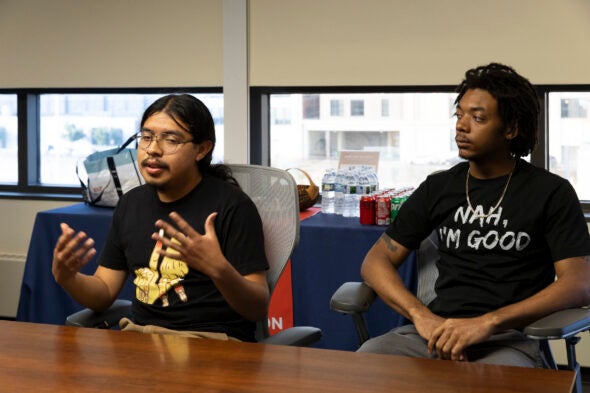
Edvin Rios can still remember arriving in Chicago from Guatemala as an 8-year-old boy and holding his younger sister’s hand as they rode the bus to attend grade school in a new city where neither knew the language.
“I was holding her hand for her to feel safe, but I don’t know if I really did it for her to feel safe or for myself to feel safe,” said Rios, a junior majoring in urban education.
Rios said the Brothers Teaching program has helped him focus on his dream of earning a master’s degree in educational policy, teaching in the city’s most underserved communities and becoming a role model to other young immigrants.
“I know there are a lot of kids right now who need that adult, especially a male Latino who can speak the language,” said Rios, who has endorsements in mathematics and bilingual/ESL instruction. “I want to be able to help kids like that.”
After earning his associate’s degree in community college, he joined UIC’s Call Me MiSTER program last year. Now he is one of the older students in the Brothers Teaching program and serves as an informal mentor to the younger students.
Rios offered encouragement and support to the younger students, who took in his words with grateful smiles and nods of thanks.
“You guys are going to do great and positive things in your and your family’s lives,” Rios said. “You are going to have little ones looking up to you.”
